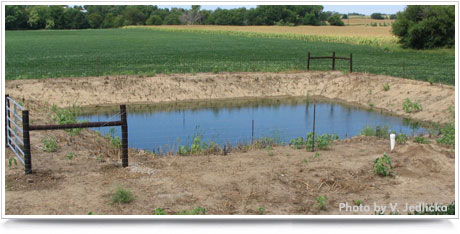Do you have questions about your private drinking water supply? How about wellhead protection, including the management of your private sewage treatment system? Send your questions using the Ask An Expert feature on this web site. Questions will be addressed by Nebraska Extension Educator Meghan Sittler, Nebraska Extension Specialist Bruce Dvorak, and/or Nebraska Extension Educator Katie Pekarek. One question and answer will be featured each month in this section of the acreage web site.
Q: I have a residential lagoon, what are key maintenance items I should perform?
Meghan: Residential lagoons are quite common in portions of eastern and southeastern Nebraska as they are well suited for soils with slow percolation rates. To keep the lagoon operating properly and safely there are maintenance items you should conduct each month as well as others that are done every one to four years.
Each month you should take a few minutes to visually inspect your lagoon. Check the fence that surrounds the lagoon to identify any holes, gaps at the bottom or damage to the gate. The fence must be in sound condition to limit opportunities for animals to accidentally enter the lagoon (which can cause a bigger maintenance issue) as well as for the safety of children.
Make sure that the berm or dike that surrounds the lagoon is in good condition and you don’t see signs of erosion, sloughing or animal burrows. Also make sure that there is good grass cover on the berm and in the area surrounding the lagoon. It is important to keep the grass between 3 to 6 inches to allow airflow through the lagoon. Make a regular mowing schedule as grass grows throughout our warm spring, summer and fall months. Also make sure that any volunteer trees or woody plants are not growing within 50 feet of the lagoon. The root systems from trees or shrubs can grow into the lagoon berm or dike and potentially cause damage.
You can find more information on both additional routine and less frequent maintenance items at: http://water.unl.edu/sewage

